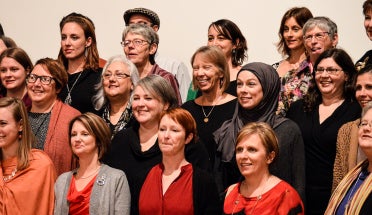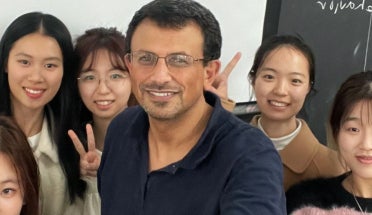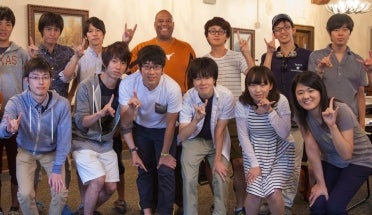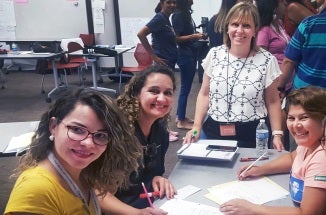
English Language Program Coordinator Draws from Own Experiences as International Student
- Aug 27, 2020
- English Language Center
- by Suvi Bhalgat
Fotini Terzi, Ph.D., has two loves in her career: grammar and writing. Since high school, she has been teaching and sharing these with others, drawing from her personal background to guide her educational practices.
Terzi currently serves as the English Language Program and undergraduate courses coordinator at the English Language Center (ELC), where she uses her international background to help others studying abroad as she did.
Born and raised in Thessaloniki, Greece, Terzi started learning English at the age of seven and quickly mastered the language. She says that English is much easier than Greek, but spelling was always an issue — specifically the word “understand.” When Terzi’s teacher explained “understand” was actually made up of two other words, “under” and “stand,” something clicked and Terzi finally learned how to spell. Now a teacher herself, Terzi hopes to make similar breakthroughs with her students.
Terzi graduated high school with an English language teaching certificate and went on to earn her bachelor’s degree in English language and literature from the University of Thessaloniki, one of the largest higher education institutes in Greece. It was there that she began her career as an English as a Second Language educator.
Terzi then attended the University of Mississippi, where she received her master’s degree as well as her doctorate in TESOL later on. She still refers to the school by its colloquial name, “Ole’ Miss,” indicating her affection and the cultural impact of her time there.
Terzi’s own collegiate experiences have taught her to be empathetic to issues her international students at the ELC may face. She recalls the culture shock she faced the day after she first landed in the U.S. and arrived at the University of Mississippi campus.
“I got the university newspaper and in big headlines, it says ‘Greek Week,’” she said. “I’m like, ‘Oh really, how many Greeks are there here?’ I had no idea about the Greek system, and I later discovered I was the only Greek on campus.”
After this initial misunderstanding, Terzi quickly attuned herself to Ole Miss campus culture. She kept in touch with her advisor, “an amazing lady,” after she graduated from the master’s program. Later, she returned to the campus to pursue her doctorate.
Once Terzi had received her doctorate, she came to Austin and began her career at the ELC. She was able to work for two semesters on an optional practical training visa, a program that allows recent international graduates to work in the U.S. for a limited period following graduation. Once her OPT period expired, she had to take a hiatus from her teaching position until she received her green card a few years later. Since then, she has taught numerous English courses and hundreds of foreign students, learning something new from each one.
Terzi’s time studying abroad as well as her global career working extensively with ESL learners has given her the essential knowledge and skills to make the ELC a supportive environment for students.
“Because I was an international student, I can associate with the difficulties of international students,” she said. “I’ve learned a lot of things from my students. It’s very interesting when you deal with a number of students that are from different cultures as well as different majors.”
Terzi says the cultural exchange happening between ELC students and instructors as well as other members of the UT community is incredibly valuable. Because of this attribute, Terzi likens teaching to traveling.
“When you travel, you learn all sorts of things about a culture,” she said. “When you meet students from different cultures and try to teach them how to use a verb or how to write a certain thing, then you can see the influence of their first language. I think it has expanded my horizons a lot as a teacher and as a person. I may never be able to go to South Africa but here I can learn all kinds of things firsthand from my students.”
Terzi says that this collaboration makes her job immensely rewarding. She loves seeing the look on her students' faces when a concept finally clicks for them. One of her favorite memories is getting her first batch of students in Greece ready for the First Certificate in English exam.
“Getting the students ready for that specific test and seeing their improvements through the semester was very rewarding as a new teacher,” Terzi said.
These experiences have taught Terzi how to be more flexible and organized. They have also made her more familiar and understanding of other cultures, enabling her to connect better with her students at all levels.
“I think it’s wonderful that ELC students can meet other international students, that they can meet Americans and work on campus, listen to people and talk to people,” she said. “I’ve seen my students coming out of their shell completely when they’re here and that is wonderful.”
Terzi says the small class sizes and cohort-type programs are a great way for students to engage with one another and improve their English. She says that this closeness helps them create a support system away from home of peers working towards a common objective. Additionally, students have ELC faculty support.
“We take care of our students,” she said. “They are not just going to go to their classes and then leave the class. We have all the social activities and we try to get them together as much as we can. Just the first week of registration, we give them a tour of campus and we give them a tour of Austin. We try to embrace not only the student as a student but also the student as a person.”
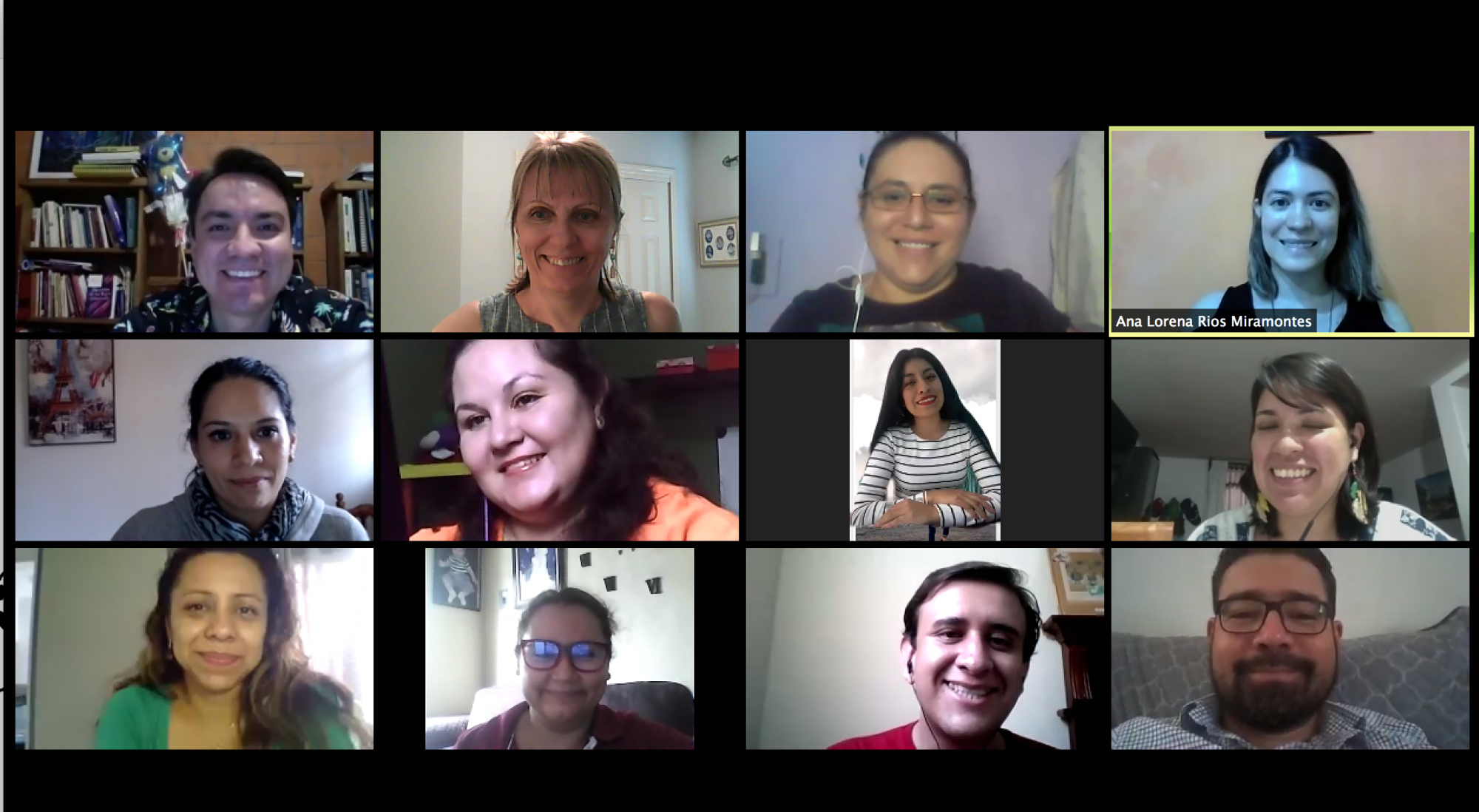
Terzi says despite the travel complications caused by the global COVID-19 pandemic, her classes are still just as interactive and fruitful as before. By using tools like Zoom and Canvas, ELC teachers like Terzi have adapted their teaching style to accommodate students’ needs while maintaining the authentic ELC classroom feel.
“We still have small groups, we still have projects, we still have all kinds of things that we ask the students to do,” she said. “Just because it’s online, doesn’t mean that we’re not going to do the things that we used to do in the classroom.”
Additionally, students are participating in larger assignments that further their interaction with one another. One of her classes’ latest projects was to make a presentation about their favorite artists using three gerunds and three infinitives. Terzi says she was blown away by her students’ slideshows and it was fascinating to see how invested they all were in each other’s work.
Terzi believes these practical engagement opportunities will help provide a similarly immersive learning environment to physically being on the UT campus, something she attributes to the high quality of education the ELC provides.
“I know students prefer to be immersed in the culture and that can be an issue with online classes,” she said. “That’s where quality education comes in and all the extra things that we offer students like social events, meeting other students and then bringing them together even though they are at home.”
Reflecting on her experiences both as a student and as a teacher, Terzi strongly encourages everyone to learn a new language. While it may be frustrating at times, she says to not give up.
“Go for it,” she said. “It’s wonderful learning a language because not only are you learning the language but you are also learning about the culture. Sometimes it can be disheartening because you feel like you’re not learning, but you are.”

